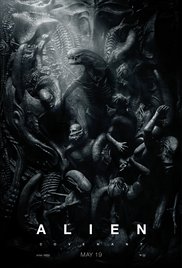On this episode of the Reel World Theology Podcast:
 We finally get a chance to touch on one of the most famous sci-fi franchises in film history: Alien. What is it about this franchise that has captivated audiences for decades? What can we learn about Ridley Scott by his attempts to go back and revision the Alien universe? What questions is he asking? What answers does he offer? Does Alien: Covenant help or hurt the franchise? We have a lot to discuss on this one!
We finally get a chance to touch on one of the most famous sci-fi franchises in film history: Alien. What is it about this franchise that has captivated audiences for decades? What can we learn about Ridley Scott by his attempts to go back and revision the Alien universe? What questions is he asking? What answers does he offer? Does Alien: Covenant help or hurt the franchise? We have a lot to discuss on this one!
Download Episode 135 Here:
Reel World Theology #135 – Alien: Covenant and Standing in for God
Reel World Theology on Stitcher
Reel World Theology on FeedBurner
Reel World Theology on Google Play
This episode’s panel included Paul Muzzin and Steve Norton:
Paul Muzzin (@riptidestudios)
Chasing Atlantis (@chasingatlantis)
Steve Norton (@PastorStevePBC)
Screen Fish
Podcast Notes and Links:
Reel World Theology Discussion Group
Alien: Covenant at IMDB
Alien: Covenant at Rotten Tomatoes
Alien: Covenant Review at Reel World Theology
Alien: Covenant Review at Cinemayward
Playing God in Alien: Covenant at Think Christian
Alien: Covenant is too muddled to pull off its deeply ambitious Satan allegories at Vox
Why Prometheus Deserves to be Taken Seriously at The Atlantic
Joss Whedon Reflects on What Went Wrong With Alien: Resurrection at Comic Book Movie



I find it really strange you call humans the “absent/abusive parents” of the androids in this series. I don’t see any of that. Ash was believed by the humans in his crew to be one of them, which helped him to betray them. He didn’t have any gripes with humanity, he was just (like HAL) doing his job and regarding the crew as expendable. Bishop (who does appear in Alien 3 as well) was known as a machine, but quite well integrated into the squad. David has actually met his personal creator, Weyland, and Weyland seems to be more of a parent to him than his own daughter. David just decides from the beginning that he has superseded humanity.
Oram’s faith was mostly just there to make him feel insecure in his command, and that insecurity is why he decides to change course rather than order the crew (who were already disobeying him) back into cryosleep.
“Humanity” as a whole doesn’t try to fight off the xenomorphs. Most humans don’t know they exist, and the company keeps trying to obtain them. If you want to include Alien: Resurrection, even after the company goes under the government tries the same thing.
Oram’s decision to follow David AFTER finding out that David had fatally misled them about their safety from the creature is the one bit of unforgivable stupidity in the film. In contrast, I had no problem with Daniels. David had been attacking her, while Walter protected her, and when a one-handed person who looks & sounds like Walter shows up to protect her from the aliens, it seems entirely reasonable for her to conclude Walter (the more advanced model) won the fight and has rejoined her.
David doesn’t care about the corporation. He despises all of humanity.